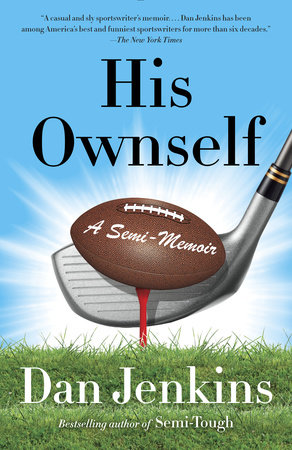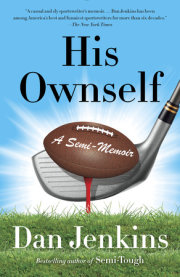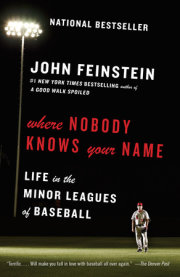Chapter 1
The Fine Art of Sitting Around and Hanging Out
It seems to me that in my busiest years of writing for a living, I spent most of my free time in convivial bars. I didn’t seek out the bars so much for the whiskey as I did for the atmosphere. A decent bar was a place where I could sip a cocktail, smoke a cigarette, have engrossing conversations with friends, and if there was music at all it was a jukebox with Sinatra and Judy and others on it with a regard for melody--in contrast to today’s eruptions of Krakatoa. I could sit in comfort and eventually reach for a cheese stick or a deviled egg. Dinner at last.
There were a lot of bars like that. They were easy to find after I’d licked another deadline for--in order of my employment--the Fort Worth Press, Dallas Times Herald, Sports Illustrated, Playboy, and Golf Digest.
Hotels provided such hangouts. Downtowns offered them. Neighborhoods had them. They provided a calmness and sanity to life, travel, deadlines, and those occasions when an editor might mistake a machete for a pencil.
Truthfully, I can say that in sixty-five years of covering sports and sidelining as a book author, my stuff hasn’t been raped and plundered too much. There were a few times at Sports Illustrated in the New York days when I’d feel that my stuff suffered cruel and unusual punishment. If an editor, for example, would insert “faster than a speeding bullet” in my copy, I’d resist the urge to throw his pot plant overboard. Instead, I’d take out my revenge by staying in another luxury hotel on the road.
Say it was the Beverly Hills. I’d reserve a cabana by the pool, relax over a cocktail, have a McCarthy Salad, and watch the fat music mogul in thongs and dark glasses yell at people on the phone.
Those were the days when it was almost impossible to abuse an SI expense account because the magazine was wallowing in coin. It enabled me to avoid discomfort and inconvenience.
It was in a bar that I reconnected with the incomparable June Burrage, girl of my dreams since high school. The bar in Fort Worth was the Key Club in the Western Hills Hotel, and we dined later in the Branding Room. We were both between pictures.
After dinner I took out my gold Dunhill, lit her cigarette, stared into her eyes, and said, “I’ve got Texas with nine and a half over Syracuse in the Cotton Bowl--what do you think?”
She said, “Can I go?”
We should have married years earlier, but life got in the way. I made two earlier mistakes in the marriage game.
My first was Pattie, the high school girlfriend. We were married for, oh, thirty minutes, maybe forty-five. Just long enough for both of us to realize it was financially irresponsible.
The second was less of a marriage than two people finding themselves trapped in an Edward Albee play. Joan was a young English professor at TCU and she happened to come from a wealthy family, which made her twice as smart as me.
Both divorces were almost the same thing as affable. No kids or money involved. Each split fell into the category of You Take the Books, I’ll Take the Records.
Flashback. It’s 1997 at the Ryder Cup in Valderrama, Spain. I was in the press lounge, which could pass for a bar, when I was told that a lady from America was at the door and wanted to say hello. I went out and found a slender woman in dark glasses and graying hair.
“I’m sorry,” I said. “Do we know each other?”
She said, “I’m Joan, you asshole.”
Christ, I hadn’t seen her in forty years.
I said, “It is you! What are you doing here? You used to hate golf. You used to throw clock radios at golf.”
“Nice seeing you, too,” she smiled.
We laughed and visited for twenty minutes about life itself, then she went back to Austin, Texas, and I went back to acting interested in Spain.
June married at nineteen in her folly of youth, and it didn’t last for whatever reason, or reasons, some marriages don’t last.
The fact is, I’ve been the luckiest sumbitch ever allowed to make a living as a writer. Luckier still that June and I found each other. We’ve produced three wonderful kids--Sally, Marty, and Danny. We enjoy great friends from high school, college, journalism, and sports. We’re still laughing and loving our way through life after fifty-four years together.
It’s hardly news that there’s trouble, strife, and entanglements in everybody’s life. But when messy things happen, I tend to fall back on the words of Billy Clyde Puckett.
Billy Clyde didn’t go to Harvard, but he was still deep enough to say: “Laughter is the only thing that cuts trouble down to a size where you can talk to it.”
My down time was more satisfying in civilized bars. A civilized bar is where it was discovered that the problem with sitting around is you never know when it’s over.
Part of the appeal is that cynical wit exists in civilized bars where writers gather. As do suggestions on how editors with tin ears and blue pencils can be captured and put in straitjackets for making stories look like squirrels have been nibbling on them.
Incidentally, I have to say that bars looked more civilized before so many sportswriters began wearing shorts and sneakers. Today you can find dozens of them armed with bottles of funny-colored health drinks. Things that could pass for A‑Rod’s specimen.
Among them, there’s always one who will take it to DEFCON 2 if anybody lights up a Marlboro.
Many are friends and while I’m pleased to see them looking fit and comfortably attired, it’s not easy to envision the old heroes of my trade--John Lardner, Red Smith, Damon Runyon--walking around in public in shorts and sneakers.
It’s a severe challenge today to find a bar that’s not a war zone, even if I only want one Junior and water at this stage of my development. Granted, I used to require twenty to become witty and charming, or rich and powerful, or to make other people interesting.
The mindless din in a bar today renders it next to impossible to chat about worldly things. Like, you know, exactly how many Kardashians are there? Is Sean Penn still grieving over Che Guevara’s execution? And how many NFL players will be tackled by their hair this season?
As for the music, melody has been replaced by something that brings to mind dueling leaf blowers, with lyrics written for juvenile delinquents.
A while back I was moved to raise my voice as I sat alone at the breakfast table. In the paper I came across this review of a rapper named Mucus something. I could have the name wrong. The critic wrote:
“A richly textured effort. The lyrics slip past in an elliptical blur. Heartbreak drifts to the surface, leaving only the beautifully conceived sound-scapes catapulting into staggering new dimensions.”
To nobody I shouted, “Jesus H. God! It’s not Irving Berlin, you pathetic moron!”
In most bars these days even a hold‑it is part of the din. Yelling, chirping, screeching. Except she’s not a hold‑it anymore. Or a stove (over forty), a stovette (under forty), or a chick, a babe, or a shapely adorable. She’s a young hotness.
“I note a deluge of young hotness in here tonight,” I overheard a young man say shortly after the twenty-first century arrived.
In my day a young hotness was Debbie Reynolds in Singin’ in the Rain. A mature hotness was Cyd Charisse in Singin’ in the Rain. Today in my opinion a young hotness suffers from sundry defects. A ring in her nose, a zircon in her eyebrow, a diamond on her tongue, a safety pin in her navel, and a dragon on her back.
Up on the walls there are these TV announcers howling with their unbridled enthusiasm about nothing. Tiger Woods has made a two-foot putt. Tiger Woods has pumped his fist. Tiger Woods has finished 43rd in the tournament but will take away a lot of positives from the experience.
I recall a night in one of these places where a stranger tried to have a conversation with me at the peak of the din.
He said, “You headed to the British?”
“What fish?”
“I said British . . . the Open.”
“I hate Oakland.”
“I think it’s at Birkdale.”
“It’s your birthday?”
“I liked your story on the Masters.”
“You ask her--I think she’s with someone.”
In this age there are bars I avoid with the same nimble footwork that enables me to avoid fish tacos and kangaroo nachos.
I give you the arena where eight or more NFL games glisten on the TV screens as hordes of intellectuals in Dallas Cowboy jerseys or with blocks of cheese on their heads do fist bumps to celebrate an incomplete pass.
Then there’s the rock-cafe emporium. Among the artifacts on the walls are a framed tooth that fell out of Mick Jagger’s mouth when he turned 106 years old, a jar of Vaseline Jim Morrison autographed for Janis Joplin, and the leg of a corpse left over from a Led Zeppelin concert.
So what is a decent bar, you may ask?
To start, it’s not political. If you grow loud discussing the issues that divide us today, you have to go outside and stand in the blizzard with the smokers.
I frequently discussed politics with Bud Shrake, one of my oldest friends and a fellow writer--he the Communist infiltrator, me the Vast Right-Wing Conspiracy--but we never got angry. As Bud explained to his liberal Austin friends, “If it gets serious, we settle it at Ping-Pong.”
A decent bar becomes a personal clubhouse. Many of the customers are friends. If there’s music, it’s tuneful. If there’s no Sinatra or Judy on the jukebox, there are the anthems of Willie and Kris and Patsy. Which was when country music peaked. The writer Allison Glock summed up today’s country in a piece in the New York Times. “Pop in cowboy hats,” she called it. Damn, I wish I’d said that.
My personal clubhouse has good, simple food at all hours. The all-day breakfast is available. You’ll never find quail eggs, avocado, or fois gras on the cheeseburgers. The place isn’t fancy. Clean and comfortable does it. The lighting is right. Not too dark, not too bright, just sort of golden. Lighting that in my younger days made the occasional lady look like Barbara Jane Bookman and me look Witty and Charming, Part II.
In the SI days when I was traveling constantly, there were special haunts that required my presence as soon as the plane landed, my ankles had been taped, and I’d rubbed on the eye black.
Club XIX in the Pebble Beach Lodge was one. It was from the same stool at the end of the bar in Club XIX that I covered four U.S. Opens, a PGA Championship, and twelve Crosby tournaments.
In the evenings the place would be awash with movie stars, golfing heroes, sports immortals. A man could sit there and watch it all come and go, including a variety of tricky ladies, some of whom were even wives. The time in there deserved the name I gave it.
I blurted it out one night in a moment of brilliance. It was when James Garner pushed into my corner to order an after-dinner beverage, and said, “Why am I not surprised you’re still here?”
“I’m waiting for Lana Turner,” I said. It stuck with friends.
Garner said, “I think I saw three earlier.”
Another place that demanded my presence was the Polo Lounge in the Beverly Hills Hotel. I got there too late for Clark Gable, Marlene Dietrich, Will Rogers, and Jean Harlow, but the Polo Lounge was--and still is--a historic landmark for sitting around.
I would stay at “the Hills” when I’d go to L.A. for USC football games, UCLA football games, Ram games, Rose Bowls, Super Bowls, L.A. Opens, book tours, or urgent Hollywood confabs and pow-wows.
I would establish headquarters in the Polo Lounge. The use of a handy money clip earned me the devoted friendship of the three gentlemen who ran the room in those years--Dino, Walter, and Nino.
I couldn’t guess how much whip-out it took for me to progress from “Good evening, Mr. Jessup” to “Good evening, Mr. Jamson” to “Ah, Mr. Jenkins, right this way.”
I’d be led to one of the front booths on the left, dark green and cushiony. The guacamole, cheese dip, and chips would appear, and a plug‑in phone--like I might need to return Paul Newman’s call.
Back in Manhattan, home for thirty years, I’d settle into Elaine’s, P. J. Clarke’s, and Toots Shor’s to relax and enjoy doing three of my favorite off-duty things--smoking, drinking, not giving a shit.
I called it “sailing to Europe” if I devoted a full evening to Elaine’s, and found myself ordering backups for total strangers who’d joined my table. The check could equal the passage on an ocean liner to Cherbourg.
I relied on character and conditioning to see me through such nights.
Elaine was sitting with June and me and Mike Lupica of the Daily News the night she made the remark that was widely quoted in her obits. A first-time customer leaned in to ask her where the men’s room was. She glanced down at the opposite end of the room, and said:
“Uh . . . go to Michael Caine and take a right.”
In a joint where celebs were part of the woodwork, I took a celeb to Elaine’s on occasion. A Darrell Royal, a Jack Nicklaus. But my major celeb was David Merrick, the biggest Broadway tycoon in the days when Broadway was Broadway. We became friends when he bought Semi-Tough for the movies.
My wife and I often dined at Elaine’s with Merrick, and with his associate Allen DeLynn. Allen was a walking book of theater, Hollywood, and sports anecdotes.
It’s been written that Merrick was “feared by many, liked by few, but never disregarded.” I have to say he was wonderful to us and our kids. He wanted to pay Sally’s tuition when she was accepted at Stanford. It made June cry.
I said, “David, it’ll be easier on my money clip if I handle the tuition. You can get the car, drugs, guns, and pizza.”
It surprised me to discover that Merrick was a big sports fan. I got him a press credential and took him along when I covered the U.S. Open in 1980 at Baltusrol in New Jersey. I found a moment around the putting green to introduce him to Jack Nicklaus. He’d wanted to meet Jack, a fellow icon.
Copyright © 2014 by Dan Jenkins. All rights reserved. No part of this excerpt may be reproduced or reprinted without permission in writing from the publisher.





